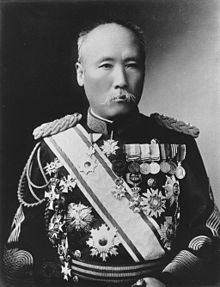Fukushima Yasumasa
Fukushima Yasumasa ( Japanese 福島 安 正 ; * May 27, 1852 in Matsumoto , Japanese Empire , † February 19, 1919 in Tokyo ) was a general in the Imperial Japanese Army .
Life
Fukushima was born into a samurai family in Matsumoto in what was then Shinano Province . He later went to Edo to attend the Kobusho Military School in Tsukiji , where he was trained as a Hatamoto . After graduating in 1874, he went to the Ministry of Justice as a civil employee and later moved to the Ministry of the Army . During the Satsuma rebellion he fought on the side of the government troops. His quick grasp and getting along well with a wide variety of people ensured that, despite his young age, he subsequently received a post on the General Staff .
In the following years he was sent on various trips abroad. In 1879 he traveled through Mongolia, which was under the control of the Qing dynasty , and was a military attaché in Beijing, China , from 1882 to 1884 . After the outbreak of the First Sino-Japanese War he was a staff officer in the 1st Army.
After the war he made an extensive trip through British India and Burma from 1886 to 1887 . On his return he was promoted to major and sent to Berlin as a military attaché . Fukushima, who is said to be fluent in 10 different languages, quickly became a well-known person in the local upper class during his stay in Berlin. He was known as a gambling man who won all kinds of bets. He himself stated that his later ride across Russia was based on a bet with some German cavalry officers, which he concluded during a joyful drinking round. However, since several historians claim that Fukushima did not drink alcohol in its life, it is unclear whether this version of the story is not an invention. It is more likely that Fukushima wanted to surpass the ride of his role model, British Colonel Frederick Gustavus Burnaby , across Asia to the Khanate of Xiva . Since he also shared Burnaby's view that Russia was the main enemy of Great Britain and Japan, the trip may also have had a practical purpose, namely to explore the internal state of Russia.
In 1892 he finally set out on a journey from Berlin to Vladivostok . It lasted 16 months and ran roughly along the route of the Trans-Siberian Railway , which was still being built , to determine its construction progress. During his trip, the story of his 14,000-kilometer journey in Japan became known and made him a national hero among the population. Because of this, he was promoted to lieutenant colonel in absentia on March 1, 1892, while he was still in Russia . Immediately after his arrival, he was awarded the Order of the Holy Treasure, 3rd class. He donated the horses with which he had made the trip to the Ueno Zoo , where they quickly became one of the main attractions.
During the Boxer Rebellion , Fukushima was in command of the Japanese troops in Tianjin and the foreign concessions there. He then briefly attended the Imperial Japanese Army Academy to learn the tactics of the German General Jakob Meckel . Following the war, he visited Egypt , the Ottoman Empire , Persia , Arabia , Turkestan , India, Burma and Siam, among others . In 1902 he traveled to represent the Meiji Tennōs for the coronation of Edward VII of Great Britain. The real reason for his visit was his participation in the secret negotiations that led to the conclusion of the Anglo-Japanese alliance on January 30, 1902 . For this he was appointed Knight Commander of the Order of the Bath .
After a brief deployment during the Russo-Japanese War , Fukushima received the title of baron ( danshaku ) in the Kazoku aristocratic system in 1907 . From April 26, 1912 to September 15, 1914 he was Governor General of the Japanese lease area Kwantung . After his promotion to general, he was transferred to the reserve in 1914, where he was named vice president of the reservists' association.
Fukushima died on February 19, 1919 in Tokyo at the age of 66 and was buried in Aoyama Cemetery. The Matsumoto Municipal Museum exhibits some of his personal items, such as his riding equipment.
literature
- Weltrundschau (From July 15 to August 6, 1900) , in: Deutscher Hausschatz, XXVI. Volume, 1899/1900, No. 49, pp. 861–864. With portrait (photo), p. 862.
- Richard Deacon: A History of the Japanese Secret Service. Berkley Publishing Company, New York 1983, ISBN 0-425-07458-7 .
- Meirion Harries: Soldiers of the Sun: The Rise and Fall of the Imperial Japanese Army. Random House, 1994, ISBN 0-679-75303-6 .
Web links
| personal data | |
|---|---|
| SURNAME | Fukushima, Yasumasa |
| ALTERNATIVE NAMES | 福島 安 正 (Japanese) |
| BRIEF DESCRIPTION | General of the Imperial Japanese Army |
| DATE OF BIRTH | May 27, 1852 |
| PLACE OF BIRTH | Matsumoto |
| DATE OF DEATH | February 19, 1919 |
| Place of death | Tokyo |

